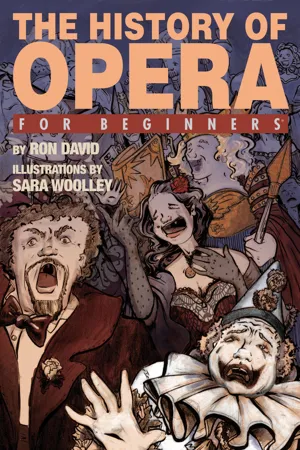
This is a test
- 176 pages
- English
- ePUB (mobile friendly)
- Available on iOS & Android
eBook - ePub
The History of Opera For Beginners
Book details
Book preview
Table of contents
Citations
About This Book
The History of Opera For Beginners is a humorous, little book which starts with the radical assumption that Opera is just plain old music, rather than the highbrow, inaccessible music that everyone assumes it to be. The reader will learn the difference between Italian and German Opera and why you don’t have to study a new language to enjoy Opera. The History of Opera For Beginners is an ideal introduction for people who are convinced that opera is solely for those refined few who were born listening to arias. Written in short, humorous, and informative chapters, and laced with some of the opera world's juiciest anecdotes, this guide is sure to convert even the most ambivalent of music lovers.
Frequently asked questions
At the moment all of our mobile-responsive ePub books are available to download via the app. Most of our PDFs are also available to download and we're working on making the final remaining ones downloadable now. Learn more here.
Both plans give you full access to the library and all of Perlego’s features. The only differences are the price and subscription period: With the annual plan you’ll save around 30% compared to 12 months on the monthly plan.
We are an online textbook subscription service, where you can get access to an entire online library for less than the price of a single book per month. With over 1 million books across 1000+ topics, we’ve got you covered! Learn more here.
Look out for the read-aloud symbol on your next book to see if you can listen to it. The read-aloud tool reads text aloud for you, highlighting the text as it is being read. You can pause it, speed it up and slow it down. Learn more here.
Yes, you can access The History of Opera For Beginners by Ron David, Sarah Woolley in PDF and/or ePUB format, as well as other popular books in Medien & darstellende Kunst & Opernmusik. We have over one million books available in our catalogue for you to explore.
Information
Subtopic
OpernmusikACT ONE:
OPERA HISTORY & COMPOSERS
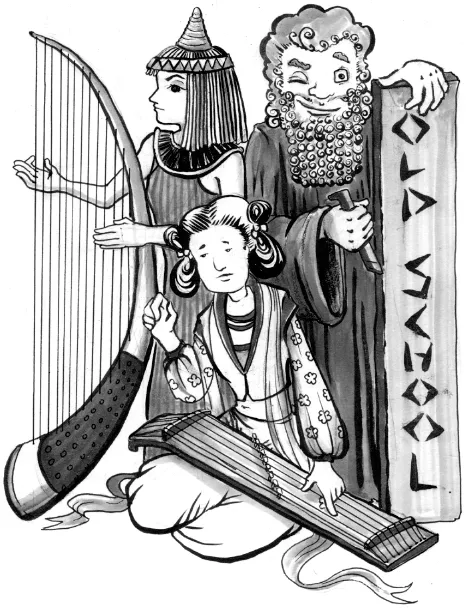
“I did not say history was bunk.
I said it was bunk to me. I didn't need it very bad.“
I said it was bunk to me. I didn't need it very bad.“
—Henry Ford
I suppose the point of that quote is we all “need it very bad” whether we realize it or not?
(…on the other hand, you won't die without it.)
SCENE 1:
PRE-OPERATIC ROOTS AND EARLY HISTORY
OPERA'S ANCIENT ROOTS
(…or, Who Do We Blame?)
(…or, Who Do We Blame?)
Opera's origins are usually traced back to the dramas of ancient Greece, and left at that. But that isn't playing fair with cultures that laid the groundwork and predated Greece by thousands of years. By the time Aeschylus wrote the first Greek “tragedy” (Drama), elegant folks in Mesopotamia, Africa and the Far East had been refining Music and Literature for 3000 years!
Here are a few highlights:
| 4000 BC— | Harps and flutes were being played in Egypt |
| 3000 BC— | The Egyptians invent the Heb-Sed, Sumerians (Iraq) write the first epic tale: “Gilgamesh” |
| 2500 BC— | Chinese develop a five tone musical scale; the first epic poetry is written in Babylon (Iraq) |
| 2000 BC— | The first novel is written in Egypt: “The Story of Sinuhe” |
| 1000 BC— | Professional musicians sing and play in ancient Israel |
| 800 BC— | The earliest written music appears in Samaria (Ancient Palestine) |
| 484 BC— | Aeschylus writes the first Greek tragedy |
By the time Aeschylus wrote the first Greek drama Egyptians had been doing the Heb-Sed for over 2000 years!
“Skuza bro’, but what is a “Heb-Sed?”
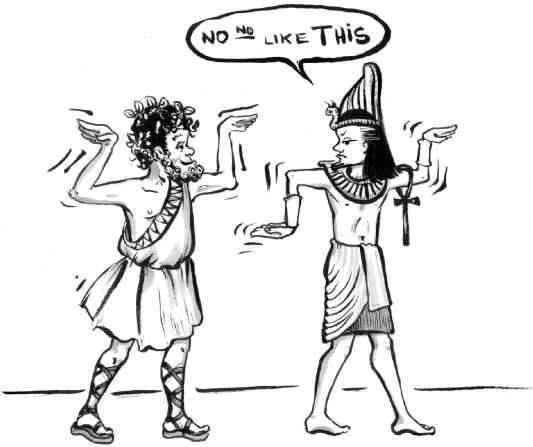
The Heb-Sed
In old, old, OLD Egypt, when the king got too rickety to rock ‘n rule, they iced the old geezer! Around 3000 BC, the Egyptians, creative dudes that they were, decided to try replacing the real murder with a ritual “pretend” murder: the Heb-Sed.
The Heb-Sed evolved into Passion Plays in which the Egyptians acted out stories from Egypt's glorious past. Evidence suggests that the Passion Plays were often sung and accompanied by music.
Around 600 BC hundreds of Greek ships hit the sea to escape the grouchy Spartans. So many Greeks settled in Egypt that the Pharaoh gave them a city! The Greeks were impressed with Egyptian temples, Egyptian religion and they were truly dazzled by the Egyptian Passion Plays!
In 484 BC, Aeschylus wrote the first Greek “tragedy.”
THE HEB-SED, the root of Greek tragedy, was created by Egyptians some 2500 years before the Greeks “invented” Drama. It is not a question of multiculturalism. It is a matter of simple intellectual honesty.
(So the Greeks invented Drama in approximately the same sense that Pat Boone invented “Blueberry Hill“—capish ?)
If you're looking for someone to blame for the origin of opera, blame the Egyptians, blame the Mesopotamians, blame the Chinese, blame the Greeks…blame Human Nature. People everywhere have the impulse to sing and act out stories, so opera in some form seems to be hardwired into us.
Origin is one thing, perfection is another. The evolution of opera in the West has been dominated by the interplay—sometimes collision—of the Italian and German schools of opera.
But we are getting ahead of ourselves.
THE ANCIENT GREEKS Aristotle
From what historians know of Greek tragedy, much of the play was chanted or sung. Although the music hasn't survived, Aristotle and his contemporaries tell us that music was an important part of Greek tragedy. From Aristotle's classical definition of tragedy:
Tragedy…is the imitation of some action that is important, entire…by language, ornamented and rendered pleasurable…. In some parts meter alone is employed, and others, Melody.
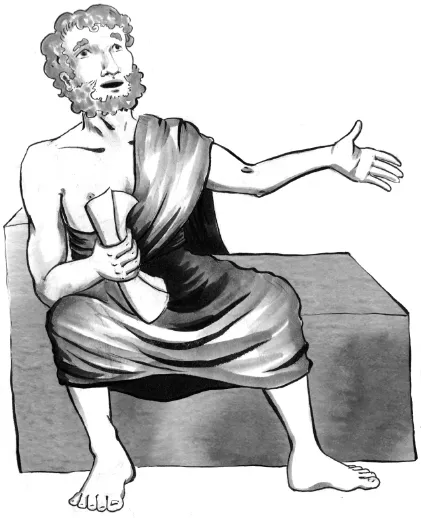
(The structure of Greek tragedy will be clearer as we go. Aristotle's concept of ‘unity’ has strongly influenced every form of ‘long’ storytelling—especially novels, plays and opera.)
Music
The musical parts of Greek tragedy were never allowed to stand on their own or to compete with the text. Greek playwrights believed that the Music had to be kept within strict bounds or it would overpower the Drama.
It's not that the Greeks were afraid of music—they just understood its power.
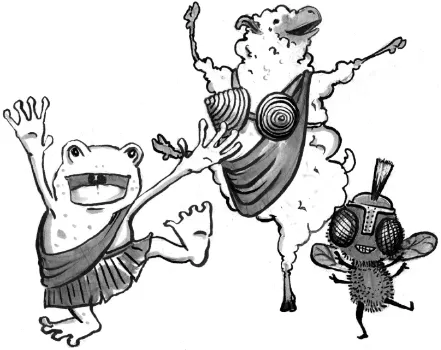
Greek playwrights didn't mix comedy and tragedy. Greek comedy was spoken—although the chorus was sung. The chorus was often in the form of animals—flies, frogs or sheep—and their singing foolishly parodied the chanting tragic choruses.
THE ANCIENT ROMANS A Funny Thing Happened…
Roman Dramas also used Music. Roman actors and actresses sometimes sang their lines, as did the choruses. The tragedies of Seneca—plays like Medea, The Trojan Women, and Hercules on Oeta—followed the Greek model and included a chorus to be sung.
Some historians consider Roman comedies the ancestors of our Broadway musicals.
The two most famous Roman comic playwrights, Plautus and Terence, used songs in their plays…
…then we spent the next thousand years waiting for something cool to happen…
Stephen Sondheim's A Funny Thing Happened on the Way to the Forum (1962) was a takeoff on Roman musical comedy.
THE DARK AGES The Middle Ages
“…zzz…zzz…zzz…”
The Dark and Middle Ages were like a sicko's multiple-choice test:
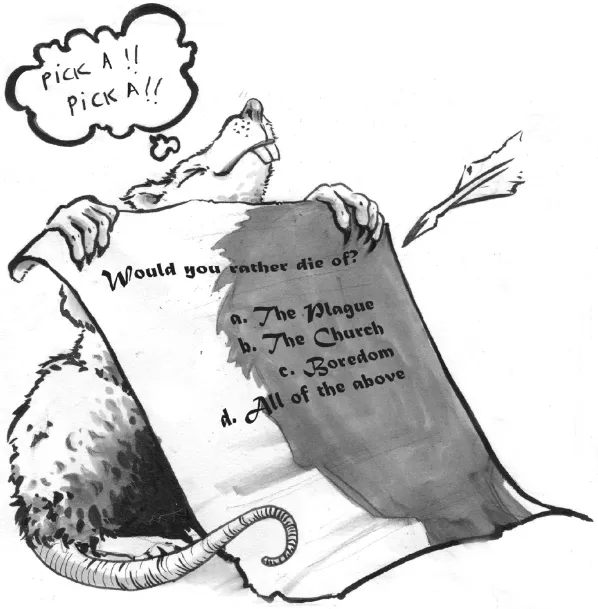
Limping Toward the Renaissance
Inspired by greed, power, and several utterly insane versions of Christianity, “the Church” killed Jews, Muslims, freethinking Christians—and nonconformism of any kind. That lasted for several bloody centuries until the 14th century, when the rise of the great city-states of northern Italy brought the brain-dead Middle Ages to a halt. What little musicky drama existed during the Middle Ages revolved around religion. Priests and nuns mounted Christmas and Easter plays that, when combined with Gregorian chants, became what is called pre-operatic.
The “Quem Quaeritis” Plays
The most famous of the pre-operatic church dramas is the Quem Quaeritis play (quem quaeritis means “Whom do you seek?”). In these Easter-week plays, a group of women go to the tomb to anoint Christ's body. At the tomb, an angel asks them whom they seek. When they say they seek Jesus, the angel tells them that Christ has risen from the dead. This brief encounter was staged and sung. Other characters were added. Eventually it presented the whole story of Christ's crucifixion, all or mostly sung.
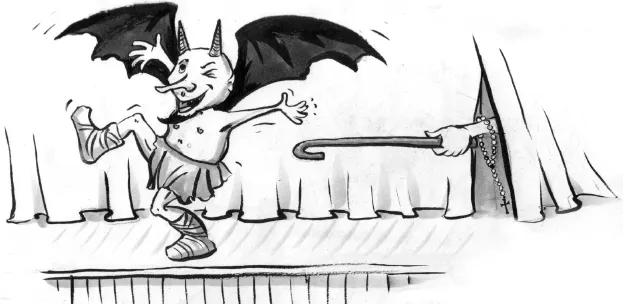
As these plays evolved they became less religious and more theatrical. They began to include figures like bawdy devils, which became so popular with audiences that the bishops ordered the plays removed from the church and into the village marketplaces. Finally, after centuries of hibernation, people began to wake up.
They call their awakening “the Renaissance“—the Rebirth.
To them, it was a return to ancient Greece.
THE RENAISSANCE Italy
Italy was the home of Michelangelo and Leonardo. Italy was the place where Vivaldi hid in a monastery in fake monkhood just so he could write a few hundred hit tunes. Italy was the stomping-ground of princes and popes. Italy was a place where rich guys with time, money and brains made grand plans to perfect man and beautify the world. No two ways about it:
Italy was the heart, soul and pocketbook of the Renaissance.
The Camerata Group
The Camerata group, sponsored by Count Giovanni Bardi, was founded in Florence Italy in 1573. The group—c...
Table of contents
- Cover Page
- Title Page
- Copyright Page
- Contents
- Introduction: Shawshank & the Fat Lady
- Act One: Opera History & Composers
- Act Two: Opera Singers
- Act Three: Listening to Opera
- Act Four: ‘Listener-Friendly’ Operas
- Curtain Calls